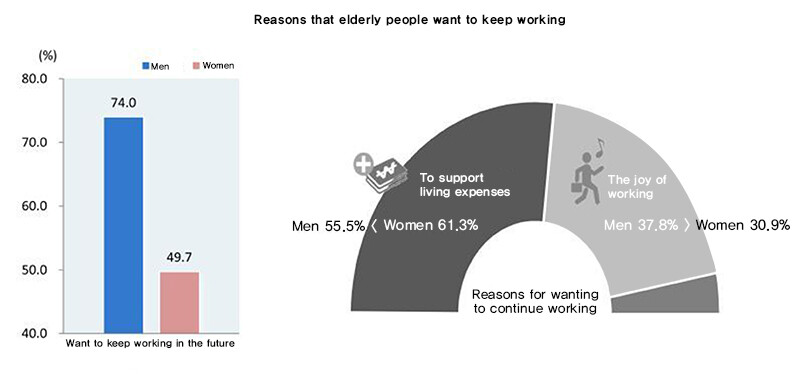hankyoreh
Links to other country sites 다른 나라 사이트 링크
For living expenses, 61.2% of elderly people want to keep working

Six out of 10 elderly people (between 55 and 79 years of age) in South Korea said that they wanted to keep working, according to a recent survey. The main reason they want to work is “to support living expenses” (58%). In other words, older people can’t stop working even after they retire because of concerns about supporting themselves in their old age.
According to 2016 statistics about the elderly that Statistics Korea released on Sep. 29, 61.2% of people between the ages of 55 and 79 said that they wanted to keep working, representing a 0.2 percentage point increase from last year. The most common reason given for wanting to work was “to support living expenses,” chosen by 58% of responses. Other responses were “the joy of working” (34.9%), “because I’m bored” (3.4%) and “because society needs it” (2.2%).
The percentage of people who mention living expenses as their reason for working in the future has been steadily rising, from 54% in 2014 to 57% in 2015. This indicates that the elderly still feel pressure about covering their living expenses, even though government welfare spending (including a basic pension program) has been increasing under the administration of South Korean President Park Geun-hye.
South Koreans between the age of 55 and 79 also appear to be having trouble preparing for their twilight years. While the percentage who say they are getting ready for retirement continues to increase, more than half of respondents still say they are not making such preparations. Last year, just 46.9% of respondents said they were doing so.
When asked about how they were preparing for their old age, the method chosen by the greatest percentage of respondents was savings and deposits (34.4%). Other methods included the national pension plan (22.6%), real estate (16.4%) and various public pension plans (12.9%). The percentage of respondents who were preparing for their old age increased from 34.7% to 46.9% between 2005 and 2015.
There is also a shift in public opinion toward the position that people should prepare for their own retirement. In 2006, 67.3% of people between the ages of 55 and 79 said that children were responsible for taking care of their parents, but in 2014, the percentage of people who responded in this manner was down to 34.1%. This contrasts with the fact that respondents who think that parents should take care of their own retirement increased from 13.7% to 23.8%, during the same period. Respondents who think that families, the government and society all share responsibility for the elderly more than doubled, up from 14.9% in 2006 to 35.7% in 2014.
On a related point, government statistics show that 419,000 elderly people in South Korea were enrolled in the Basic Livelihood Benefits program last year. In addition, 42.3% of people who are 65 and older were found to be receiving a form of public pension (such as the national pension or the pension for public servants). These individuals were receiving an average of 510,000 won in pension payments.
By Noh Hyun-woong, staff reporter
Please direct questions or comments to [english@hani.co.kr]

Editorial・opinion
![[Column] Park Geun-hye déjà vu in Yoon Suk-yeol [Column] Park Geun-hye déjà vu in Yoon Suk-yeol](https://flexible.img.hani.co.kr/flexible/normal/500/300/imgdb/original/2024/0424/651713945113788.jpg) [Column] Park Geun-hye déjà vu in Yoon Suk-yeol
[Column] Park Geun-hye déjà vu in Yoon Suk-yeol![[Editorial] New weight of N. Korea’s nuclear threats makes dialogue all the more urgent [Editorial] New weight of N. Korea’s nuclear threats makes dialogue all the more urgent](https://flexible.img.hani.co.kr/flexible/normal/500/300/imgdb/original/2024/0424/7317139454662664.jpg) [Editorial] New weight of N. Korea’s nuclear threats makes dialogue all the more urgent
[Editorial] New weight of N. Korea’s nuclear threats makes dialogue all the more urgent- [Guest essay] The real reason Korea’s new right wants to dub Rhee a founding father
- [Column] ‘Choson’: Is it time we start referring to N. Korea in its own terms?
- [Editorial] Japan’s rewriting of history with Korea has gone too far
- [Column] The president’s questionable capacity for dialogue
- [Column] Are chaebol firms just pizza pies for families to divvy up as they please?
- [Column] Has Korea, too, crossed the Rubicon on China?
- [Correspondent’s column] In Japan’s alliance with US, echoes of its past alliances with UK
- [Editorial] Does Yoon think the Korean public is wrong?
Most viewed articles
- 1‘We must say no’: Seoul defense chief on Korean, USFK involvement in hypothetical Taiwan crisis
- 2Will NewJeans end up collateral damage in internal feud at K-pop juggernaut Hybe?
- 3[Column] Park Geun-hye déjà vu in Yoon Suk-yeol
- 4Why Korea shouldn’t welcome Japan’s newly beefed up defense cooperation with US
- 5Thursday to mark start of resignations by senior doctors amid standoff with government
- 6N. Korean hackers breached 10 defense contractors in South for months, police say
- 7[Guest essay] The real reason Korea’s new right wants to dub Rhee a founding father
- 8[Column] ‘Choson’: Is it time we start referring to N. Korea in its own terms?
- 9Kim Jong-un expressed ‘satisfaction’ with nuclear counterstrike drill directed at South
- 10[Editorial] New weight of N. Korea’s nuclear threats makes dialogue all the more urgent